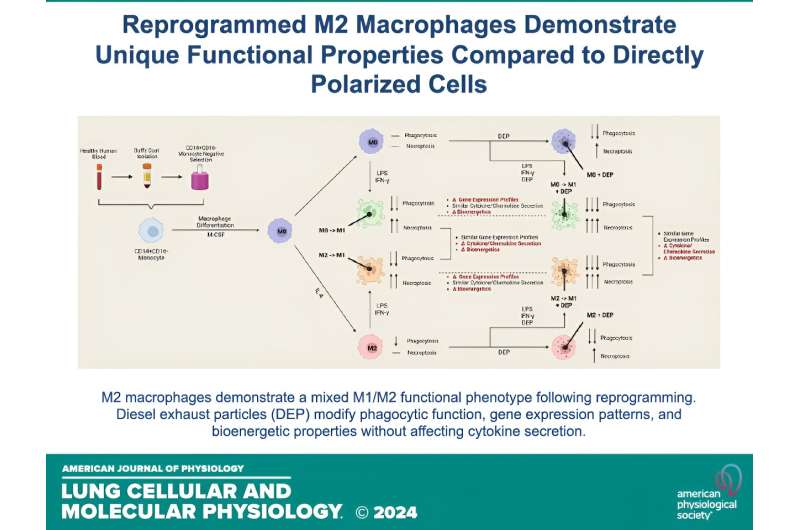This article has been reviewed according to Science X's editorial process and policies. Editors have highlighted the following attributes while ensuring the content's credibility:
fact-checked
trusted source
proofread
Diesel exhaust may harm the immune system, trigger inflammation

Exposure to diesel exhaust particles triggers higher levels of inflammation, especially during a respiratory infection, according to researchers from the University of North Carolina at Chapel Hill. Researchers found that diesel exhaust exposure impedes a process that boosts immune responses and modifies the body's protective response to tissue-damaging immune cells.
In addition, their findings suggest exhaust particle exposure could lead to increased inflammation in the lung. The study is published in the American Journal of Physiology-Lung Cellular and Molecular Physiology. It has been chosen as an APSselect article for February.
Research has long shown that air pollution has a negative effect on human health. Diesel exhaust is a common form of air pollution present in industrialized communities. Short-term exposure to diesel exhaust can lead to headache, dizziness and irritation of the eye, nose and throat. Prolonged exposure can increase the risk of lung cancer and cardiovascular, cardiopulmonary and respiratory diseases.
This study's purpose was to investigate whether exposure to diesel exhaust particles, a component of air pollution, causes changes in immune cells. Researchers wanted to examine how air pollution particles modify the ability of these immune cells to reprogram, which is needed to mount a host response against infection.
Researchers collected blood from healthy people and isolated monocytes, a type of white blood cell involved in the immune response, that develop into macrophages. The resulting monocyte-derived immune cells were exposed to various stimulants such as cytokines. This caused the cells to change into different macrophage types.
After stimulation, the researchers measured immune cell function to assess its ability to capture bacteria, energy-generating properties and biomarkers of inflammation. They found decreased ability to capture bacteria and increased biomarkers of inflammation.
"Exposure to air pollution has been routinely linked to worsening health outcomes," said Ilona Jaspers, Ph.D., lead author of the study, and a professor at the University of North Carolina at Chapel Hill.
"These findings may direct further research to this unique macrophage population, introducing new avenues of treatment to ensure proper macrophage function which in turn would improve immune responses and reduce disease severity."
More information: Timothy Smyth et al, Diesel exhaust particles induce polarization state-dependent functional and transcriptional changes in human monocyte-derived macrophages, American Journal of Physiology-Lung Cellular and Molecular Physiology (2023). DOI: 10.1152/ajplung.00085.2023
Provided by American Physiological Society





















